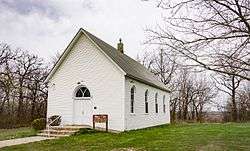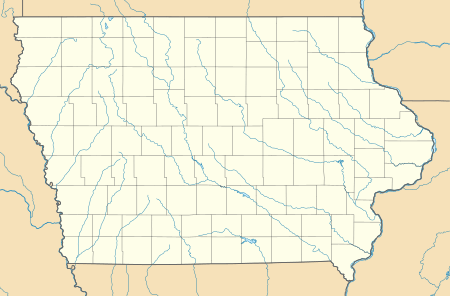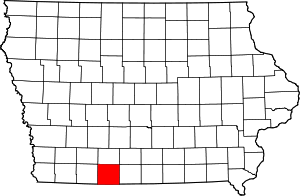Middlefork Methodist Episcopal Church
Middlefork Methodist Episcopal Church is a historic church on the South of US 169 on the east side of Middle Fork, Grand Road in Redding, Iowa, United States. It is now known as Middlefork United Methodist Church.
Middlefork Methodist Episcopal Church | |
 | |
  | |
| Location | S of US 169 on E side of Middle Fork, Grand R., Redding, Iowa |
|---|---|
| Coordinates | 40°35′47″N 94°19′3″W |
| Area | less than one acre |
| Built | 1886 |
| Built by | W.M. Staton, J.H. Savill |
| Architectural style | Italianate |
| NRHP reference No. | 90001801[1] |
| Added to NRHP | November 29, 1990 |
History
Methodist classes were organized at the Center (renamed Rose Hill) and Clipper schoolhouses in the early 1870s. The impetus to establish Middlefork Church was a six-week revival held under the leadership of the Rev. T.G. Aten and conducted by the Rev. Bill McFarland in the Spring of 1886.[2] The schoolhouses were no longer large enough to hold the number of people who attended services. Property adjacent to the centrally located Middle Fork Cemetery was chosen for the new congregation to build a church, and all the funds necessary to build the church were in hand when construction began.[3] Stone for the foundation was quarried on the Riley Motsinger farm a few miles north of Allendale, Missouri. The bricks and lumber came from Bedford, Iowa. Local carpenters W. M. Staton and J. A. Saville oversaw the construction. Construction was begun and completed in 1886. The church building was added to the National Register of Historic Places in 1990.
Architecture
Middlefork United Methodist Church is a rectangular-plan structure that measures 26 by 44 feet (7.9 by 13.4 m).[3] The exterior is covered with white clapboard siding, and it rests on a limestone foundation. Overall the building is plain. Italianate features include the tall, narrow, round hooded windows along the sides, the double-door entryway on the front, the corner boards with capitals, frieze board trim, round hood molds above the windows and the main entrance, and moldings at the eaves.
References
- "National Register Information System". National Register of Historic Places. National Park Service. July 9, 2010.
- Sharon R. Becker. "Middlefork United Methodist Church". Iowa GenWeb. Retrieved 2016-01-28.
- James E. Jacobsen. "Middlefork Methodist Episcopal Church". National Park Service. Retrieved 2016-01-28. with photos
